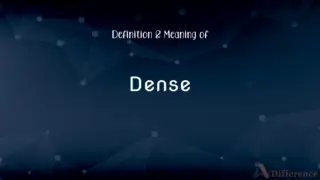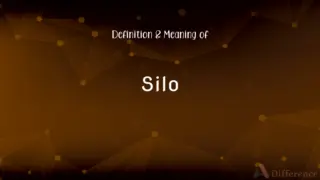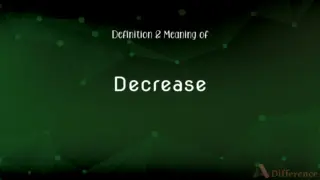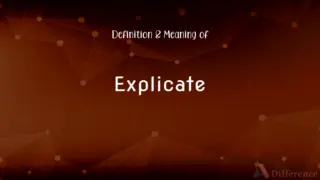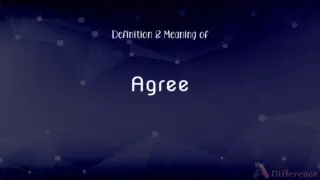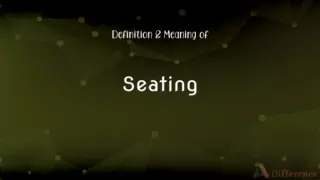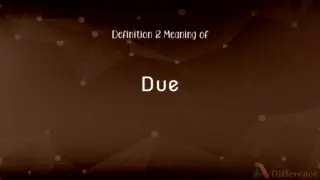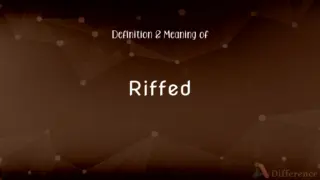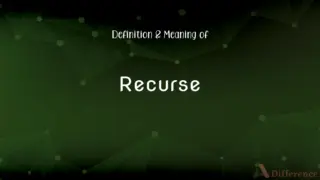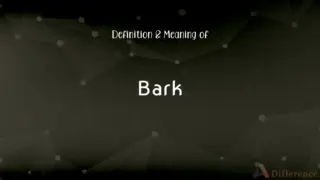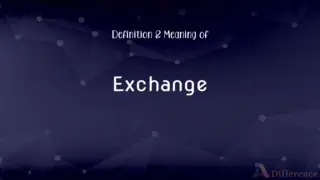Seeoff Definition and Meaning
By Tayyaba Rehman & Fiza Rafique — Updated on March 5, 2024
See off means to bid farewell or accompany someone at the start of a journey or an event. e.g., The whole family came to see off their son as he left for college.
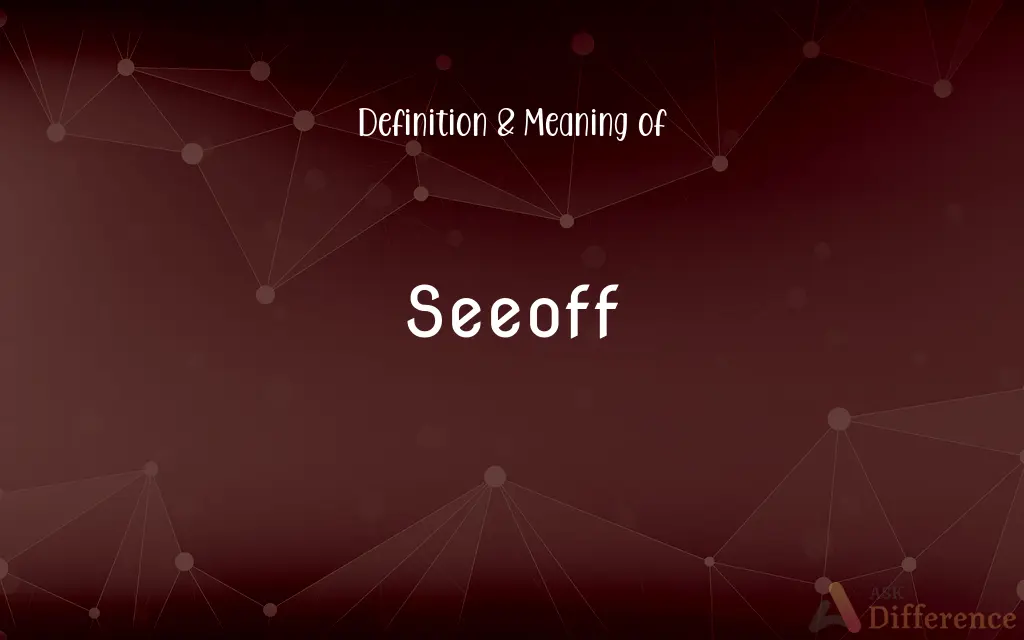
Table of Contents
Seeoff Definitions
To accompany someone at the beginning of a trip.
She saw off her sister at the train station.
To escort someone leaving on a journey.
The sailors were seen off with cheers at the harbor.
To send off someone with good wishes.
The team saw off their coach with a small ceremony.
To part with someone at the start of their journey.
He saw off his colleague with best wishes for the trip.
To farewell someone at the point of departure.
The students were seen off by their teachers on the school trip.
To bid goodbye to someone departing.
They went to the airport to see off their friend.
To accompany someone to a departure point as a gesture of goodwill.
They saw off their grandmother with hugs at the bus station.
To be present to wish someone a safe journey.
The community gathered to see off the athletes to the competition.
To ensure someone leaves safely on a journey.
She made sure to see off her children on their first day of school.
To be there for a farewell when someone leaves.
They all came to see off the volunteer group embarking on their mission.
Seeoff Snonyms
Escort
To accompany someone somewhere, especially for protection or security.
The guard escorted the visitor through the building.
Dispatch
To send off to a destination or for a purpose.
The company dispatched the parcel yesterday.
Farewell
To say goodbye to someone who is leaving.
They gathered to farewell their friend before his journey.
Bid goodbye
To say goodbye, often in a formal or ceremonial manner.
They bid goodbye to their colleagues on their last day.
Accompany out
To go with someone as they leave a place.
He offered to accompany her out to her car.
Send off
To cause or arrange for something to be taken to a place.
They had a party to send off the retiring teacher.
Wave off
To say goodbye to someone by waving one's hand.
They waved off their guests from the front porch.
Usher out
To lead or guide someone out of a place.
The event staff ushered out the attendees after the concert.
Part with
To leave or say goodbye to someone.
It was hard to part with their exchange student.
Dismiss
To send someone away; allow or cause to leave.
The professor dismissed the class early.
Seeoff Idioms & Phrases
See off at the airport
To bid farewell to someone who is leaving from an airport.
We went to the airport early in the morning to see off our friends as they embarked on their journey.
See off at the dock
To bid farewell to someone departing on a boat or ship.
They stood at the dock to see off their loved ones as the ship sailed away.
See off at the station
To bid farewell to someone who is departing from a train station.
Early in the morning, we went to the station to see off our parents as they left for the countryside.
See off into retirement
To celebrate and bid farewell to someone who is leaving their job to begin retirement.
The company organized a grand party to see off the CEO into retirement after decades of service.
See off with cheers
To bid farewell to someone amidst expressions of support and enthusiasm.
The athlete was seen off with cheers from fans and supporters as he headed to the international competition.
See off to war
To bid farewell to soldiers or military personnel being deployed.
The town gathered to see off the young soldiers to war with heavy hearts and hopes for their safe return.
See off on a journey
To bid farewell to someone embarking on a trip or expedition.
The explorers were seen off on their journey with great fanfare and media attention.
See off a challenger
To successfully confront and overcome a competitor or challenge.
The champion was able to see off a challenger in the final round of the competition.
See off with blessings
To bid farewell to someone while giving them blessings or good wishes.
Before the journey, the elders gathered to see off the travelers with blessings for their safety.
See off to university
To bid farewell to a student who is leaving home to attend college or university.
In autumn, many parents see off their children to university with mixed feelings of pride and sadness.
See off with a smile
To bid farewell to someone in a happy or positive manner.
Despite her sadness, she managed to see off her friend with a smile.
See off to a new adventure
To bid farewell to someone who is about to begin a new and exciting experience.
The whole village gathered to see off the young explorer to his new adventure across the seas.
See off on a high note
To ensure that someone's departure is marked by a positive or successful moment.
The team won their final game, allowing the coach to be seen off on a high note.
See off a threat
To successfully deal with and eliminate a danger or problem.
The community worked together to see off the threat of the flood by reinforcing the riverbanks.
See off an era
To mark the end of a significant period or era.
The retirement of the legendary player saw off an era of unparalleled success for the team.
See off with gratitude
To express thankfulness during someone's departure.
The community saw off the volunteer group with gratitude for all their hard work.
See off with applause
To bid farewell to someone amidst clapping as a sign of appreciation or congratulations.
After his final performance, the maestro was seen off with standing ovation and applause from the audience.
See off a challenge successfully
To overcome a difficult situation or competitor successfully.
The startup managed to see off a challenge successfully from larger companies by innovating rapidly.
See off in style
To bid farewell to someone in a grand or special manner.
They decided to see off their long-time colleague in style, with a surprise farewell party.
See off to the unknown
To bid farewell to someone venturing into something new or uncertain.
They were seen off to the unknown, ready to face whatever challenges lay ahead in the unexplored territory.
Seeoff Example Sentences
Her friends gathered to see her off on her worldwide adventure.
My parents came to see me off when I left for camp.
Tomorrow, we will see off our cousin at the airport.
They waved as they saw off the departing guests.
My brother and I went to the bus station to see off our grandparents.
Everyone cheered to see off the marathon runners.
The teacher came to the bus to see off her students on the field trip.
The whole neighborhood came to see off the local football team.
We stood at the dock to see off the cruise ship.
The soldiers were seen off by their families at the base.
The fans gathered at the hotel to see off their favorite band.
We brought balloons to see off our friend on his big move.
She made a sign to see off her friend moving to a new city.
They arrived early at the train station to see off their aunt.
The community held a party to see off the retiring mayor.
Common Curiosities
How do we divide see off into syllables?
"See off" is divided into syllables as "see-off."
How many syllables are in see off?
There are two syllables in "see off."
How is see off used in a sentence?
Example: "We will see off our guests at the airport."
What is the pronunciation of see off?
See off is pronounced as /siː ɒf/.
What is a stressed syllable in see off?
The stressed syllable in "see off" is the first one: "see."
Why is it called see off?
"See off" is called so because it combines "see," meaning to observe or be present with, and "off," indicating departure, reflecting the act of bidding farewell or accompanying someone as they leave.
What is the first form of see off?
The first form (present form) of "see off" is "see off."
What is the second form of see off?
The second form (past simple form) of "see off" is "saw off."
What is the verb form of see off?
"See off" itself is the verb form.
What is the opposite of see off?
The opposite of "see off" could be "welcome" or "greet."
Is see off a noun or adjective?
"See off" is a verb, not a noun or adjective.
Is see off a negative or positive word?
"See off" is neutral; its connotation depends on the context.
Is the word see off Gerund?
The gerund form of "see off" is "seeing off."
What is the root word of see off?
The root words of "see off" are "see" and "off."
What is another term for see off?
Another term for "see off" is "bid farewell" or "send off."
What is the singular form of see off?
As a verb, "see off" does not have a singular form.
What is the plural form of see off?
"See off" does not have a plural form as it is a verb.
Is see off a vowel or consonant?
The word "see" starts with a vowel, and "off" starts with a consonant.
Is the word see off imperative?
"See off" can be used in the imperative form, as in "Please see off the guests."
Which determiner is used with see off?
Determiners are not typically used directly with the verb "see off."
Which vowel is used before see off?
The use of a vowel before "see off" depends on the context of the sentence.
What part of speech is see off?
"See off" is a phrasal verb.
Is see off an adverb?
No, "see off" is not an adverb.
Is see off an abstract noun?
"See off" is a verb, so it cannot be an abstract noun.
Is see off a countable noun?
"See off" is not a noun; it's a verb.
Is the word “see off” a Direct object or an Indirect object?
As a verb, "see off" can have both direct and indirect objects.
Which conjunction is used with see off?
Conjunctions like "and" or "but" can be used with "see off," depending on the sentence.
Is see off a collective noun?
"See off" is not a noun, so it cannot be a collective noun.
Is the see off term a metaphor?
"See off" can be used metaphorically in some contexts.
Which article is used with see off?
Articles are not used directly with the verb "see off." The use of an article would depend on the noun it accompanies.
What is the third form of see off?
The third form (past participle form) of "see off" is "seen off."
Which preposition is used with see off?
Prepositions are not typically used with the phrasal verb "see off."
Share Your Discovery

Previous Term
Bland Definition and Meaning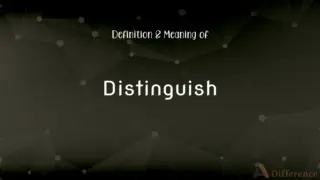
Next Term
Distinguish Definition and MeaningAuthor Spotlight
Written by
Tayyaba RehmanTayyaba Rehman is a distinguished writer, currently serving as a primary contributor to askdifference.com. As a researcher in semantics and etymology, Tayyaba's passion for the complexity of languages and their distinctions has found a perfect home on the platform. Tayyaba delves into the intricacies of language, distinguishing between commonly confused words and phrases, thereby providing clarity for readers worldwide.
Co-written by
Fiza RafiqueFiza Rafique is a skilled content writer at AskDifference.com, where she meticulously refines and enhances written pieces. Drawing from her vast editorial expertise, Fiza ensures clarity, accuracy, and precision in every article. Passionate about language, she continually seeks to elevate the quality of content for readers worldwide.









